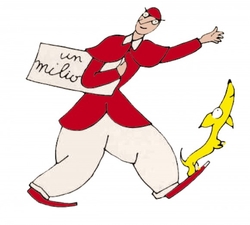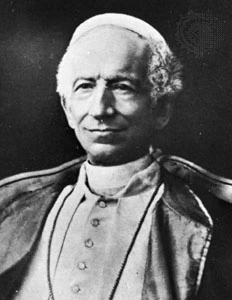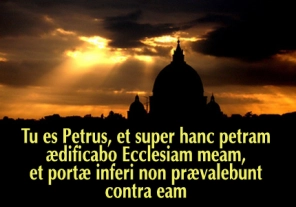The Church on the role of Latin. With a little surprise.
Below, some chosen lines out of a Vatican document of the past (feel free to skip at will 😉 ):
The Church […] values especially the Greek and Latin languages in which wisdom itself is cloaked, as it were, in a vesture of gold.
But amid this variety of languages a primary place must surely be given to that language which had its origins in Latium, and later proved so admirable a means for the spreading of Christianity throughout the West.
And since in God’s special Providence this language united so many nations together under the authority of the Roman Empire — and that for so many centuries — it also became the rightful language of the Apostolic See. Preserved for posterity, it proved to be a bond of unity for the Christian peoples of Europe.
Of its very nature Latin is most suitable for promoting every form of culture among Peoples. It gives rise to no jealousies. It does not favor any one nation, but presents itself with equal impartiality to all and is equally acceptable to all.
Nor must we overlook the characteristic nobility of Latin formal structure. Its “concise, varied and harmonious style, full of majesty and dignity” makes for singular clarity and impressiveness of expression.
For these reasons the Apostolic See has always been at pains to preserve Latin, deeming it worthy of being used in the exercise of her teaching authority “as the splendid vesture of her heavenly doctrine and sacred laws.”
She further requires her sacred ministers to use it, for by so doing they are the better able, wherever they may be, to acquaint themselves with the mind of the Holy See on any matter, and communicate the more easily with Rome and with one another.
Thus the “knowledge and use of this language,” so intimately bound up with the Church’s life, “is important not so much on cultural or literary grounds, as for religious reasons”.
“For the Church, precisely because it embraces all nations and is destined to endure to the end of time … of its very nature requires a language which is universal, immutable, and non-vernacular.”
[..] Latin [..] is set and unchanging. It has long since ceased to be affected by those alterations in the meaning of words which are the normal result of daily, popular use. Certain Latin words, it is true, acquired new meanings as Christian teaching developed and needed to be explained and defended, but these new meanings have long since become accepted and firmly established.
[..] the Catholic Church has a dignity far surpassing that of every merely human society, for it was founded by Christ the Lord. It is altogether fitting, therefore, that the language it uses should be noble, majestic, and non-vernacular.
In addition, the Latin language “can be called truly catholic.” It has been consecrated through constant use by the Apostolic See, the mother and teacher of all Churches, and must be esteemed “a treasure … of incomparable worth”.
It is a general passport to the proper understanding of the Christian writers of antiquity and the documents of the Church’s teaching. It is also a most effective bond, binding the Church of today with that of the past and of the future in wonderful continuity.
I could go on, but I think that you get the gist: this is a passionate praise of the inestimable value of Latin and of its being the only possible preferred choice for the Universal Church.
Who is the author of this? The strong anti-modernist Crusader St. Pius X perhaps? The rigid Dobermann (said in a good sense) of Orthodoxy Pius XI? Or maybe the severe, solemn, saintly diplomatic Pius XII?
None of these, dear readers. This is all taken from Veterum Sapientia, the Apostolic Constitution “on the Promotion of the Study of Latin” authored by…. John XXIII and promulgated with great pomp just a few months before the beginning of the Second Vatican Catastrophe!
This Apostolic Constitution gives you all the scale of the subversion of traditional Catholic mentality (not talking of dogmas here, merely of the general outlook on life) perpetrated during and after Vatican II. The clear impression is that V II itself has been a subversion of the very traditional “Spirit of pre-V II” which had been the basis for the preparation of the very Council; and that after the conclusion of V II, a new wave of subversion started, with the forces of demolition now unleashed and determinedly bent on subverting V II itself.
Veterum Sapientia dates February 1962. Only five years later Vatican II itself was being happily demolished by the new orgy of renewal at all cost. The Aggiornamento was eating his own children.
In my eyes, this bears two lessons for us:
1) once you begin to play with ideas of Aggiornamento, you open a Pandora’s box of great devastating power.
2) If such a great amount of devastation could be executed in just a few years without leading to the disintegration of the Church, I can’t see why a comparable amount of restoration should not be possible within the same timeframe. The Church is not a fragile LibCon coalition government needing protection from every jolt. It is a rather stabile, rock-solid institution under the protection of the Holy Spirit.
The Church has survived a great amount of falsity and heretical infiltrations. There is no limit to the amount of Truth it can withstand.
Mundabor
Posted on July 28, 2010, in Catholicism and tagged "aggiornamento", Latin, Pope John XXIII, Veterum Sapientia. Bookmark the permalink. Comments Off on The Church on the role of Latin. With a little surprise..





















You must be logged in to post a comment.